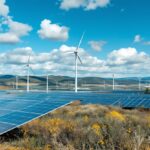Table of Contents
Understanding the drilling ban
In a bold move, President Biden recently announced a ban on new offshore drilling and oil and gas development in U.S. coastal waters, affecting over 625 million acres. This decision, made under the 1953 Outer Continental Shelf Lands Act, aims to protect the environment but has sparked a heated debate about its potential consequences.
While the administration argues that the fossil fuel potential in these areas is minimal, experts warn that the ban could inadvertently harm conservation efforts and the economy.
The economic ramifications
Critics of the ban, including Gabriella Hoffman from the Independent Women’s Forum, argue that the decision jeopardizes the future of conservation funding in America.
The Land & Water Conservation Fund (LWCF), which relies heavily on royalties from oil and gas companies, could face significant financial setbacks. Hoffman emphasizes that the fund was designed to use revenues from one natural resource to support the conservation of another, and losing these royalties could hinder vital conservation projects across the nation.
Furthermore, the Western Energy Alliance has raised alarms about the broader economic implications of the ban. Kathleen Sgamma, the Alliance’s president, pointed out that nearly every community in the U.S. benefits from parks and outdoor facilities funded by the LWCF.
The ban could threaten these essential projects, which help protect waterways, support wildlife, and enhance recreational spaces.
Environmental concerns and foreign dependence
While the intention behind the drilling ban is to promote environmental protection, experts caution that it may lead to increased dependence on foreign oil.
Daniel Turner, founder of Power The Future, highlights that cutting domestic oil production could push the U.S. to rely more on imports from countries with less stringent environmental regulations. This shift raises questions about the true environmental impact of sourcing oil from nations that may not prioritize sustainable practices.
Turner argues that if the U.S. genuinely aims to be environmentally responsible, it should focus on producing energy domestically. He points out that many foreign oil-producing countries engage in practices that are harmful to both the environment and human rights. By keeping production within the U.S., the country can maintain higher standards for environmental protection and labor rights.
The political landscape
The political implications of Biden’s drilling ban are also significant. President-elect Donald Trump has expressed intentions to reverse the ban, but he may face challenges due to the legal framework surrounding the Outer Continental Shelf Lands Act. Trump’s spokeswoman criticized Biden’s decision as politically motivated, asserting that it disregards the will of the American people who supported increased drilling and lower gas prices.
As the debate continues, it is clear that Biden’s drilling ban is a complex issue with far-reaching consequences. Balancing environmental protection with economic stability and energy independence will be crucial as the nation navigates this contentious landscape.




